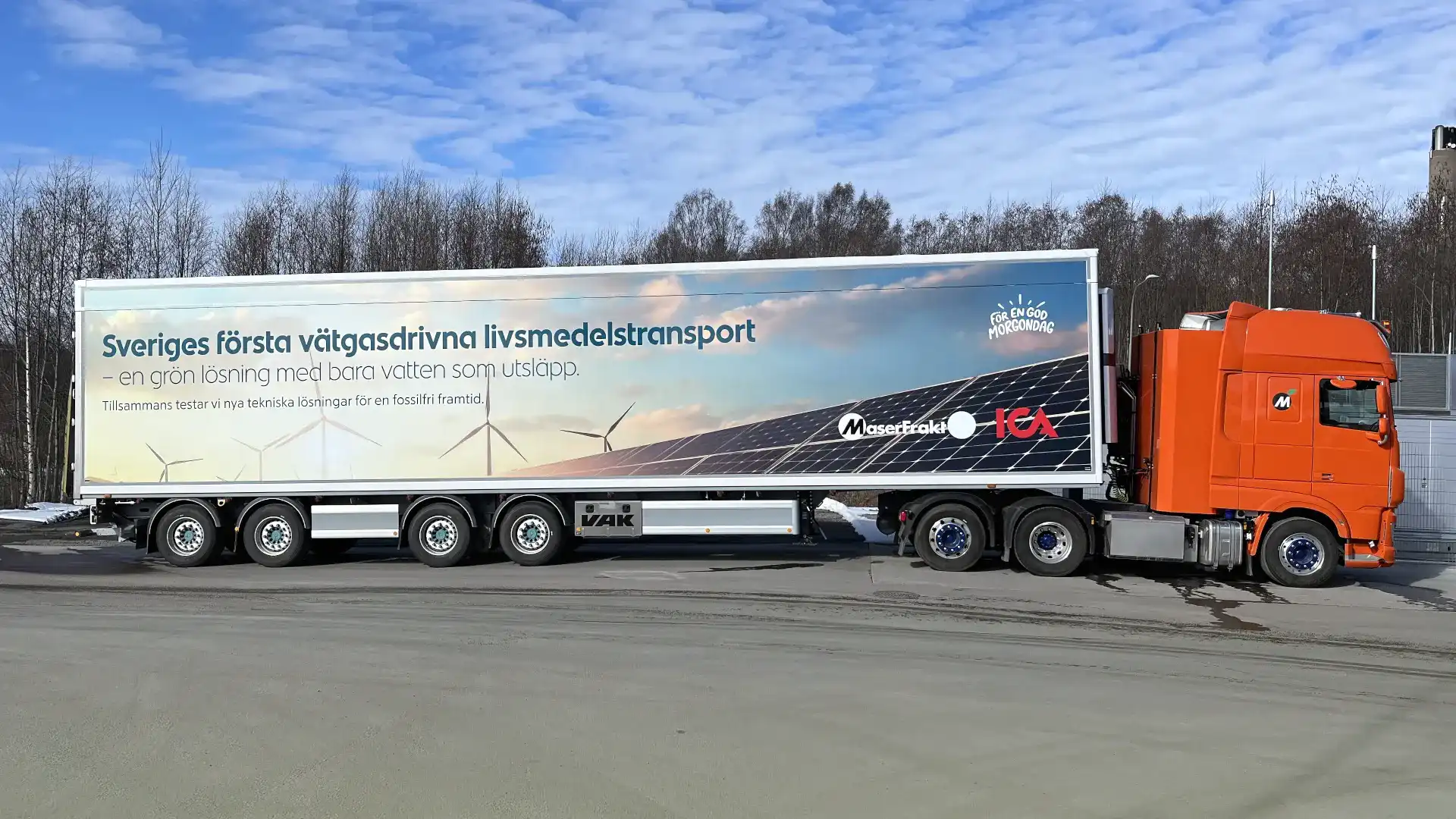Stockholm / SE. (ica) Sweden’s ICA Gruppen AB has an aggressive ambition to be fossil-free and a great need for efficiency and quality in its transportation. ICA Gruppen’s goal is to have completely fossil-free road transportation by 2030, and in metropolitan regions this will be achieved as early as 2025.
To accelerate the work towards fossil-free transport, ICA is among the first companies both in Sweden and globally to explore the potential of hydrogen for heavy goods transport in practice and is now initiating transports with a hydrogen-powered truck in collaboration with the transport company MaserFrakt. The truck will deliver goods between ICA’s warehouses and to ICA stores in Central Sweden.
 (Photo: ICA Gruppen – Henrik Lae)
(Photo: ICA Gruppen – Henrik Lae)
Hydrogen-powered heavy transport, like battery-powered electric transport, is locally emission-free, but enables a higher load weight, longer range and faster refueling compared to battery-powered alternatives.
«By promoting technological innovation, we at ICA want to lead the way towards a more sustainable and environmentally friendly transportation sector. We want to evaluate hydrogen’s potential to make our transportation fossil-free and the combination of both low environmental and operational impact is very interesting,» says Emma Lindström, Logistics Director at ICA Sweden.
The hydrogen to be used in transport is so-called green hydrogen, where the energy used in its production comes from renewable and fossil-free sources. Using hydrogen as a fuel reduces direct greenhouse gas emissions. Hydrogen-powered trucks like this one powered by fuel cell technology produce only water vapor as emissions directly from the vehicle, which is a significantly more climate and environmentally friendly solution compared to traditional diesel-powered vehicles.
ICA is working in several ways to achieve fossil-free transportation:
- Freight transport currently accounts for over seventy percent of ICA Sweden’s CO2 emissions from its own operations and therefore has a high priority to switch to climate-smart solutions.
- Since 2021, ICA has used electrified transport to an increasing extent and with larger trucks with longer range, larger geographical areas can now be covered.
- Continued prioritization of various fossil-free solutions where, among other things, biogas has grown significantly in use in recent years and now accounts for about one third of the fuel used for transport to stores and between warehouses.
- As regards the company’s long-distance sea transport, ICA is taking initiatives to significantly reduce emissions by replacing fossil fuels with biofuel alternatives.
OTHER TOPICS FROM THIS SECTION FOR YOU:
- Premiere: Fortum makes biodegradable plastic from CO2
- Mainstreaming sidestreams: Food products made from salmon
- StrongPoint: installs AutoStore with deep-freeze zone
- Bezos Centre for Sustainable Protein Opens at NU Singapore
- VTT: How to turn captured carbon dioxide into plastic?
- Enifer Oyi: The first factory is now fully funded
- How AI’s efficiency can be optimised in the gastronomy
- Tender Food: successfully closes Series A funding
- Aramark: now lets autonomous floor cleaning robots do the work
- Santander Bank: opens another »Work Café« in Florida
- Ülker: accelerates digitalization and tech investments
- Enifer Oyi: secures 36 million euro funding package
- Coop: Tomatoes from Sweden no longer a rarity
- Lantmännen Group: in talks on Food Strategy 2.0
- Växthuset: Business-driven and circular ideas in focus
- BBU: Commences Multi-Site Microgrid Energy System
- Chipotle: Doubles Commitment To Cultivate Next Venture Fund
- Bühler: brings the entire protein value chain under one roof
- Oterra A/S: forms pioneering partnership with Vaxa Technologies
- Conagra Brands: Uncovers Hottest Frozen Food Trends



